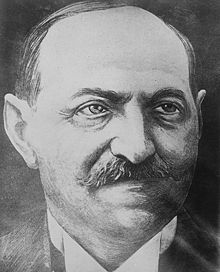Hugo Haase
| Hugo Haase | |
|---|---|

Hugo Haase
|
|
| Federal Member of the Reichstag | |
|
In office 1897–1907 |
|
|
In office 1912–1919 |
|
| Chairman of the Social Democratic Party of Germany | |
|
In office 1911–1916 |
|
| Chairman of the Independent Social Democratic Party of Germany | |
|
In office 1917–1919 |
|
| Personal details | |
| Born |
29 September 1863 Allenstein, East Prussia |
| Died | 7 November 1919 (aged 56) Berlin |
| Political party | SPD, USPD |
| Spouse(s) | Thea Lichtenstein |
| Children | Ernst Haase |
| Alma mater | Königsberg University |
| Occupation | lawyer |
Hugo Haase (29 September 1863 – 7 November 1919) was a German socialist politician, jurist and pacifist. With Friedrich Ebert, he co-chaired of the Council of the People's Deputies after the German Revolution of 1918–19.
Hugo Haase was born on 29 September 1863 in Allenstein (today: Olsztyn), in the Province of East Prussia, the son of Jewish shoemaker and small businessman, Nathan Haase, and his wife Pauline (née Anker).
After attending the Gymnasium at Rastenburg, Haase studied law in Königsberg (now Kaliningrad), joined the Social Democratic Party of Germany (SPD) in 1887 and the next year established himself as a lawyer. He was the first socialist lawyer in East Prussia and mainly took on as clients people from the lower classes (workers, peasants), journalists and socialist functionaries. In 1894, Haase became the first Social Democrat in the municipal parliament (Stadtverordnetenversammlung )of Königsberg. In 1897, he was elected to the Reichstag in a by-election.
In multiple legal cases, he defended Social Democrats against various politically motivated charges. High-profile cases that made him known throughout the country included the so-called Königsberger Geheimbundprozeß in 1904, in which he achieved acquittals for several politicians including the later Minister President of Prussia, Otto Braun. In 1907, Haase was counsel for Karl Liebknecht (SPD) who had been charged with high treason for publishing his screed Militarismus und Antimilitarismus.
...
Wikipedia
